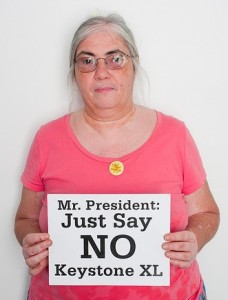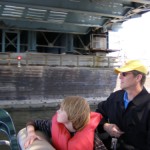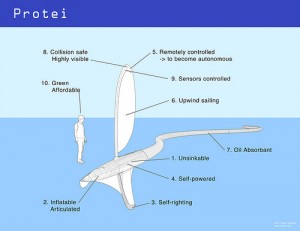Here’s a note from ENJ’s director
Environment New Jersey is endorsing Sen. Bob Gordon and Assemblywoman Connie Wagner for re-election this fall. In fact, defending their seats is one of our top priorities in this election.
Here’s a few reasons why:Clean Water: Both Sen. Gordon and Assemblywoman Wagner are leading the fight to keep our water supply safe from toxic chemicals used by companies who are fracking for natural gas.
Open Space: Sen. Gordon and Assemblywoman Wagner have consistently opposed developer-led efforts to weaken environmental protections for forests, wetlands and other critical open spaces.
Clean Air and Clean Energy: Sen. Gordon and Assemblywoman Wagner are fighting to save the anti-pollution program known as the Regional Greenhouse Gas Initiative, which cuts power plant pollution and promotes clean energy.
Come Tuesday, Nov. 8, I hope you’ll help defend New Jersey’s environment by casting a green ballot for Bob Gordon and Assemblywoman Wagner.
Thanks, as always, for making it all possible.
Sincerely,
Dena Mottola Jaborska
Environment New Jersey Executive Director
Launches Campaign to Mobilize Green Vote in 5 Districts
Environment New Jersey today announced its full slate of endorsements for state legislative elections this year. Receiving the group’s endorsements are: Assemblyman McKeon (D27), Assemblywoman Jasey (D27), Senator Gordon (D38), Assemblywoman Wagner (D38), Senator Greenstein (D14), Assemblyman Benson (D14), Senator Whelan (D2), Senate Majority Leader Barbara Buono (D18), and Assemblyman Barnes (D18).
“These leaders are environmental champions in the legislature. They have consistently fought for clean air and water, open space and clean energy and we need their continued leadership now more than ever,” said Dena Mottola Jaborska, executive director of Environment New Jersey.
She continued, “The leadership provided by these elected officials could not come at a more critical time with the environment facing an unprecedented number of threats. New Jersey needs legislators in Trenton who will side with the people over the polluters.”
These endorsements reflect the importance of the environment in this year’s elections. The group will conduct voter mobilization efforts targeted at their members in these five targeted districts. The group is working to recruit volunteers from among its 60,000 active members and supporters statewide.
Volunteers are being asked to join Environment New Jersey’s staff in its plan to mobilize the green vote in these districts, and organizers will contact every Environment New Jersey member in these districts via e-mail and phone-banking. Follow-up phone banks will be held on October 30, and November 5th, 6th, and 7th in Trenton, South Orange, Highland Park and Fair Lawn to help get out the vote for these environmental leaders.
Governor Christie has announced plans to entirely end the RGGI program in New Jersey, to weaken our clean energy goals, and to adopt an environmental loophole policy.
In the last two year, these leaders have advanced a number of environmental protections and fought a number of rollbacks to pollution-busting programs. They include a clean fertilizer bill that protects waterways statewide from pollution, a ban on fracking, and the establishment of a ground-breaking off-shore wind financial incentive program.
“In the past two years, these leaders have helped put in place some of the strongest clean water and clean energy policies in the nation, ensuring New Jersey continues to lead the way on strong environmental protection,” said Mottola Jaborska.
Those endorsed are also working to oppose the NJDEP environmental loophole bill (known as the waiver rule), to defend the RGGI program which cuts pollution from power plants, and are backing legislation to strengthen the state’s clean energy standard and protect its funding.
“Voters who care about the environment must not sit this election out. Environment New Jersey will be making sure environmentally-minded voters in these key districts know just how critical their vote really is this year. We’ll be educating them about the issues that hang in the balance, and why we need these legislators to be re-elected, so they can continue to fight for strong environmental protections,” said Mottola Jaborska.
Assemblyman John McKeon (D27) represents sections of Essex and Morris County. He is the Chair of the Assembly Environment Committee and was a prime sponsor for a package of bills to protect Barnegat Bay, most notable a key bill to set strict pollution limits for the Bay which was conditionally vetoed by the Governor. The Assemblyman was the leading prime sponsor of legislation to defend the RGGI program in the state which was vetoed by the Governor in August. He was a prime sponsor of a groundbreaking bill that establishes financing for wind energy off New Jersey’s coasts and has recently introduced new legislation to expand the state’s renewable energy standard (to 30%) and set a mandatory state policy that would cut energy demand by 20%. The Assemblyman has consistently worked against and voted against bills that would weaken environmental protections, including one that would allow the NJDEP to make substantial changes without taking public comment.
Assemblywoman Jasey (D27) also represents sections of Essex and Morris County. She has also consistently opposed environmental deregulation bills and was a prime sponsor along with Assemblyman McKeon of a bill to set strict pollution limits to clean up Barnegat Bay. She also co-sponsored the bill to defend the RGGI program.
Senator Gordon (D38) was the leading prime sponsor of the fracking ban bill that passed this June and was conditionally vetoed by the Governor. He was a co-sponsor of a bill to set strict pollution limits for Barnegat Bay and has consistently opposed bills that would weaken environmental protection including one that would allow the NJDEP to make substantial changes without taking public comment.
Assemblywoman Wagner (D38) was the leading prime sponsor of the fracking ban bill that passed this June and was conditionally vetoed by the Governor and she was a co-sponsor of the clean fertilizer bill. She co-sponsored the groundbreaking bill that establishes financing for wind energy off our coasts and she has consistently opposed bills that would weaken environmental protection including one that would allow the NJDEP to make substantial changes without taking public comment.
Senator Greenstein (D14) was a prime sponsor of the fracking ban bill that passed this June and was conditionally vetoed by the Governor and she is also a prime sponsor of new legislation to expand the state’s renewable energy standard (to 30%) and set a mandatory statewide policy to cut energy demand by 20%. Senator Greenstein has consistently opposed bills that would weaken environmental standards and has one of the best environmental voting records in the Legislature.
Assemblyman Benson (D14) was a co-sponsor of the fracking ban bill that passed this June and was conditionally vetoed by the Governor and he was a co-sponsor of the bill to save the RGGI program that the Legislature passed this June before being vetoed by the Governor.
Senator Whelan (D2) has been a leading voice of opposition against the Governor’s plan to leave the RGGI program and the Governor’s Energy Master Plan. He co-sponsored both the ground- breaking bill that established financing for wind energy off our coasts and the fracking ban bill that passed this June and was conditionally vetoed by the Governor.
Senate Majority Leader Barbara Buono (D18) has been a leading voice of opposition against the Governor’s attempts to deregulate environmental protection and consistently has voted against environmental rollback bills in the Legislature. She has recently introduced a resolution opposing the NJDEP waiver rule, and she also co-sponsored the fracking ban bill that passed this June and was conditionally vetoed by the Governor.
Assemblyman Barnes (D18) was a prime sponsor of the Save RGGI bill that passed this June and was vetoed by the Governor. He consistently co-sponsors and supports key environmental legislation, including the fracking ban bill, the clean fertilizer bill, and the bill that would have set strict pollution limits for Barnegat Bay.












